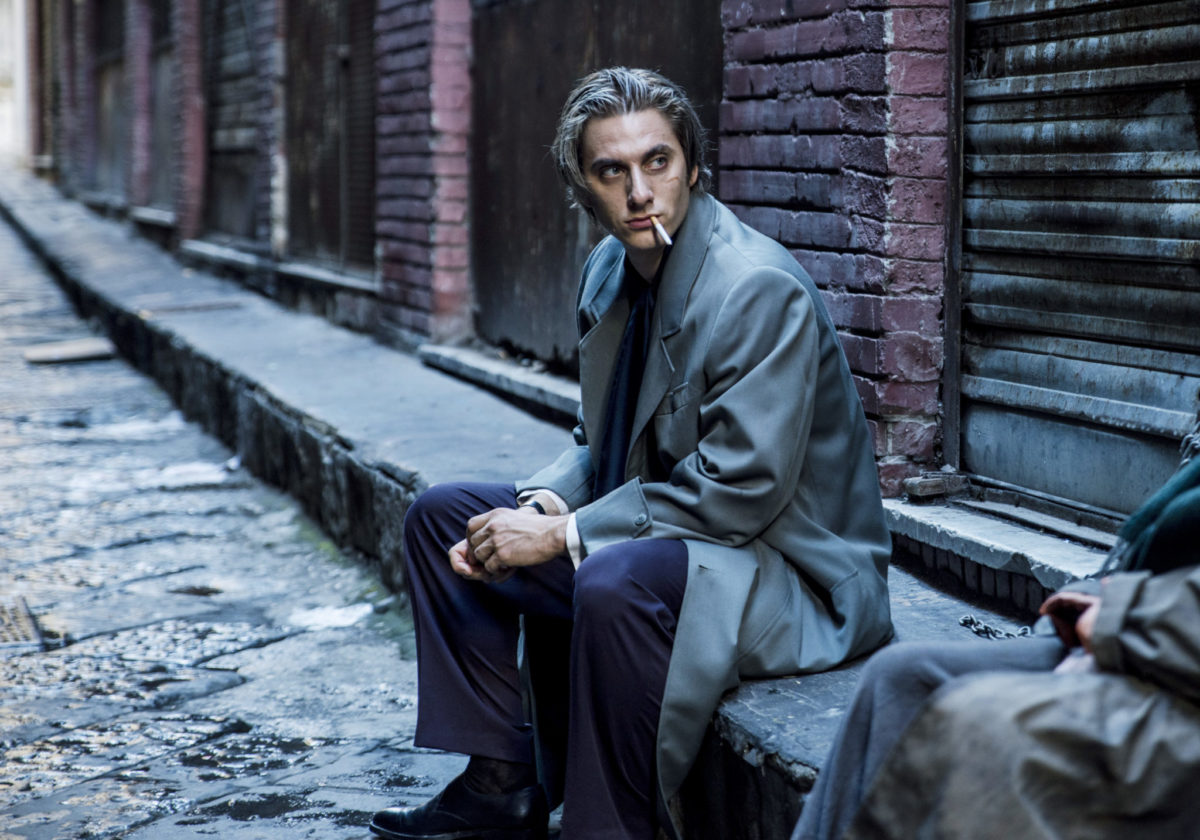For his adaptation of Jack London’s “Martin Eden,” Pietro Marcello changed the setting of from the novel’s pre-WWI America to pre-World War II Italy. He told us his Martin Eden is “connected to what’s happening in today’s world in terms of hedonism and narcissism.” Which is another way of saying: a solipsistic society that requires world-shaking events to wake us up to the rise and resurgence of fascism. But this isn’t a #Resistance film. No, Marcello’s Martin Eden involves Eden as an interloper who educates himself and rises in society’s ranks. His struggle is with the uneducated world from which he comes and the educated elites who want little to do with him.
With his new film now arriving in Virtual Cinemas, we spoke with Marcello about Martin Eden’s autodidactic education, how Luca Marinelli looks like Indiana Jones in the film’s marketing, neoliberals who, as Marcello says, “say they love socialism, but then they give their ass capitalism,” and modern man’s lack of connection to society.
The Film Stage: As Martin makes his ascent through education, he receives resistance from the rich community he’s aspiring to and also from the working class from which he comes. The former say you’ll never be good enough, the latter say you think you’re better than us.
Pietro Marcello: When I was a little boy, I would tell people I wanted to become a filmmaker. All I would get is, “There’s no way you’re ever going to succeed. You don’t know anybody, we have no connections. So you’re never going to pull it off.” I think as viewers when we watch that, we all recognize ourselves in him, because that’s a kind of experience that a lot of people go through in terms of wanting to achieve social success through education. Whereas, in the second part of the film, he becomes an antihero and is harder to identify with. We’re with him because he wants to become a writer but then he loses himself, and he loses his connection to reality. For example, Proust talks about himself, but Martin Eden loses touch with life, with reality, and therefore he betrays the social class he’s from.
Martin’s mentor Russ Brissenden says to him “socialism will save your writing.” What does that mean?
Russ Brissenden is concerned because he knows that Martin Eden is an individualist, but he is not an anarchist individualist––he is more of an individualist that could end up being a very right-wing person. Brissenden tells Martin, “You have to become a socialist. It might be an old worn-out suit, but there’s no other alternative.” The kind of socialism he was talking about was the socialism of Jack London. The one that was applied in the first socialist communities, not the kind that became communism, and it became other forms. It’s a different kind of socialism, the one that existed before the October Revolution. It’s a kind of socialism that goes side-by-side with Christian beliefs––St. Francis’ kind of socialism.
At the end of the film, Martin is the selfish individualist that Brissenden feared he would become, but he also gives his wealth generously to friends and people who are up and coming. How do we reconcile the selfishness we see in him if it bears generosity?
Martin does not want to betray the mandate given to him by his mentor. When Edmondo Peluso, the union leader, asks him for money, he gives him the money because he had promised that to Brissenden. That was a way of continuing on of honoring what his mentor had asked him to do. But he doesn’t do that because he believes in the trade union’s struggle in what they’re doing. He doesn’t want to support them because he adheres to what they do. He does it in order not to betray what his mentor asked of him. Likewise, he gives money to his sister because you know, he had a connection with her. That we kept as it was in the movie as well. But in terms of giving his money, he was generous, but not as a result of him having a connection with reality, and therefore wanting to have an impact on that reality. But in order to continue on with something that he had been asked to do. He didn’t feel close or love the class that he came from, or the rich. In this way, he is a somebody who is a clear expression of the modern, contemporary man, that is somebody who’s confused within society.
Martin Eden, the way it was written by Jack London, was tightly connected with the cultural world of the end of the 19th century. However, the Martin needed in this movie is very contemporary. It’s connected to what’s happening in today’s world in terms of hedonism and narcissism. This is more connected to what was being described already by Christopher Lasch in the 1970s. He is the victim of our own time. So even though in terms of the costumes, they are from an earlier day. What happens and the way he is is extremely contemporary. I want to repeat that the Martin Eden character, the way it had been written by Jack London, was still deeply connected to a 19th-century cultural world.

The posters and marketing for the movie has a classic Hollywood vibe. Martin looks like Indiana Jones on the poster.
I didn’t make the poster, the distributor made it. Do you want to know the real truth? In the history of cinema there’s beautiful films with horrible posters. What I do like is there are several images of the film that look like the way we used to do things in the 1950s. It’s a little bit like neorealism. Whether you like it or not, that’s debatable.
I like it.
I like it too, but you know, I prefer this Martin Eden poster to the modern posters. They all look the same.
What was your criteria for the footage that you inserted in the film? I get that they’re meant to be Martin’s memories and different points of his life. So what were you looking for?
On the one hand, there’s his memories, then there’s Martin’s short stories that I showed that way. And I wanted to talk about the history of the 20th century. That was a way for me to describe that. I also wanted to take a step back and say that’s a technique I’m very familiar with. It’s something I’ve always done in all my films. So that’s something that came out of familiarity.
Have you as a filmmaker experienced the kind of rejection that Martin experiences in his career?
I was very lucky. I’ve never really been rejected. But having said that, I did have to work very hard on my movies, but also in terms of doing many other jobs to support myself. I’ve struggled a lot, I’ve worked very hard, and maybe what saved me was that I was very determined. I was very stubborn and stuck to it. But having said that, I did get my hands dirty. I’ve never been rejected, though I’ve suffered a lot because injustice I saw around me, injustice I saw in the world around me. I’ve always been somebody who looks at others, who doesn’t focus on myself alone. I tend to look at others and feel for them. When I was 25, I spent three months here in New York and I worked for a moving company, and I just took loads of stuff and I threw my back out. Even though I made $300 a day, that was good, but I worked so friggin hard. At the same time I was already making cinema. I was already making documentaries. I was working in the film industry, but I was getting my hands dirty.

This is also a film on autodidacts, people who have self taught. People who didn’t look for culture in schools, but through people on the streets. I think of writers such as Hemingway, or Orwell. They were not thinking about their own little world. They were looking at the world around them, and transposing it into their literature. They were not just talking about themselves, they were looking at the world around them and trying to make sense of it. Jack London, who said the same thing, he wasn’t Proust, his was a different kind of approach.
There’s period and contemporary music in the film. It wasn’t just a throwback to the era it was based in, musically.
When the movie starts, there’s popular Neapolitan songs, very simple songs. This mirrors the way our character was naive and simple. As our character develops and becomes more and more educated, the music changes as well. In the beginning here, we have music by Neapolitan musicians, then later on we have music by Bach. This is the same kind of the ternary or path that our hero goes through, going from a sub-proletarian to a writer, and parallelly, the music evolves likewise.
There’s a scene where Martin explodes in anger over socialism for the wealthy and individualism for the poor. That was as much a concern then as it is now.
This is a part of the movie I am very fond of. It’s his political attack on neoliberalism. These people want to come off as socialists, but they are not truly socialists. They fear socialism as such. Ostensibly, they say they’re socialists, but deep down, they fear socialists. They say they’re left wing, but they’re not. And so to put it in blunt terms, they say they love socialism, but then they give their ass capitalism.
What do you think of the idea that liberalism is liberty plus progress, but it obscures liberty?
We are now at the collapse of capitalism. We see a world in Italy and Europe with souverainism. Look at Brexit, Salvini in Italy, or Trump in the US. They’re monsters. 50 years ago, nobody would have even dreamt that this would be possible, that we have completely eroded all kinds of social achievements that have cost lives, that people that fought forever in order to obtain. In terms of struggles for social justice, and now that they’re all gone, this is the world we’re in today. That’s what Martin Eden said, that the rich are richer and the poor are poorer. There’s a world in which the resources of the planet are in the hands of just a few people. This was allowed by liberalism and capitalism, and because it completely eroded the rights of so many people. If you just look around last night alone in Manhattan four homeless people were killed by another homeless person. This is such a clear sign of despair. All of us are more and more despaired and we see that all around us, even though technically we are in the world of convenience. In America, though, just like in Europe, there are some people who still believe in this. For example, you have [Bernie] Sanders and that’s an enlightened example. I think that’s a noble example.
Martin Eden is now playing at Virtual Cinemas through Kino Marquee and a retrospective of Marcello’s films is now playing at Film Lincoln Center’s Virtual Cinema.
